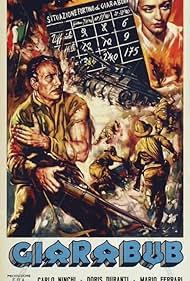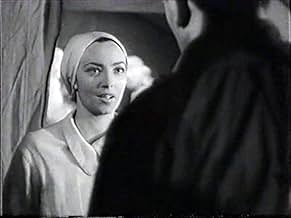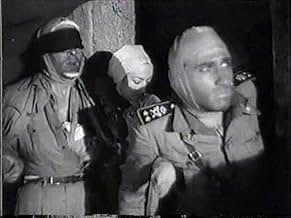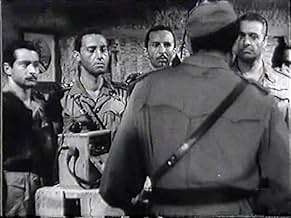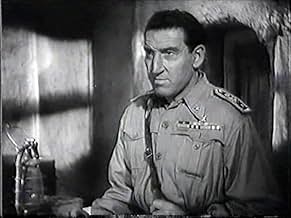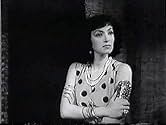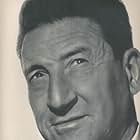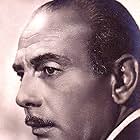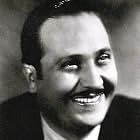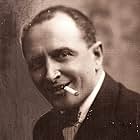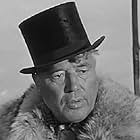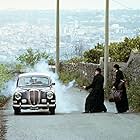Left without reinforcements, Italian troops in Libia must defend themselves down to the last man against the British.Left without reinforcements, Italian troops in Libia must defend themselves down to the last man against the British.Left without reinforcements, Italian troops in Libia must defend themselves down to the last man against the British.
Roberto Bianchi Montero
- Il capitano medico
- (as Roberto Bianchi)
Storyline
Did you know
- TriviaSome filmographies include the name of stage actress Diana Torrieri for this film. She in fact does not appear in it, her role (that of Olga, the prostitute) was cut from the final released print.
- GoofsThere's a scene in which English soldiers fight with Italian rifles (muskets model 91)
Featured review
Goffredo Alessandrini's GIARABUB, perhaps the most famous war film produced in Italy during World War II, gets its title from the name of an Italian military oasis-post in the Libyan desert. The Italians are under siege by enemy British forces, and the situation for the Italians is hopeless; they have few supplies, almost no food. It is a matter of time before they are overtaken. An emissary from the British forces gives the Italians an ultimatum for surrender. But to Major Castagna (Carlo Ninchi) surrender is not an option. The point of the film seems to be to send a patriotic message to the Italians as the worst days of the war approached, that they might maintain their calm and dignity and sense of sacrifice for the motherland in the face of overwhelming odds. The movie was required inspirational viewing for all students in Italy. The song written for the film's credits has the lyrics: "Colonel, I don't want bread, I want lead for my rifle. I don't want praise; I died for my country, but the end of England starts with Giarabub."
The movie does not deal with the thornier aspects of Italian/German military aims or fascism. Mussolini is never referred to. This is a kind of Italian DUNKIRK or LOST PATROL. Much of the film centers around the paternal major, his assessment of the situation he knows to be hopeless, his personal interest in his men (he writes addenda to their letters home noting that they are "bravi ragazzi"---good lads.) In the midst of all there very improbably appears Dolores, played by Doris Duranti, who provides some romantic appeal for as while, but is absent in her quarters for much of the movie. Alessandrini described her role as that of a soldiers' masseuse/manicurist. Doris Duranti was the great feminine icon of the Italian fascist cinema, and was reputed to have had relations with the Duce himself. Most of the film is quiet and talky, illustrating the camaraderie among men in war. The film's ending is filled with "optimism in defeat." In its way, for its human elements, the film is actually quite likable.
The battle scenes were convincing and incorporated footage from Luce documentaries that had been shot on location in Africa. The exteriors were shot in Italy. The fort itself was reconstructed in the Scalera Studio. At the same time at Cinecittà, Augusto Genina was shooting BENGASI, another North-African war film. Among the cast of GIARABUB is a very young Alberto Sordi as a wounded lieutenant. Renzo Rossellini, brother of Roberto, provided the musical score, as he did for his brother's fascist era films and post-war OPEN CITY and PAISAN.
The movie does not deal with the thornier aspects of Italian/German military aims or fascism. Mussolini is never referred to. This is a kind of Italian DUNKIRK or LOST PATROL. Much of the film centers around the paternal major, his assessment of the situation he knows to be hopeless, his personal interest in his men (he writes addenda to their letters home noting that they are "bravi ragazzi"---good lads.) In the midst of all there very improbably appears Dolores, played by Doris Duranti, who provides some romantic appeal for as while, but is absent in her quarters for much of the movie. Alessandrini described her role as that of a soldiers' masseuse/manicurist. Doris Duranti was the great feminine icon of the Italian fascist cinema, and was reputed to have had relations with the Duce himself. Most of the film is quiet and talky, illustrating the camaraderie among men in war. The film's ending is filled with "optimism in defeat." In its way, for its human elements, the film is actually quite likable.
The battle scenes were convincing and incorporated footage from Luce documentaries that had been shot on location in Africa. The exteriors were shot in Italy. The fort itself was reconstructed in the Scalera Studio. At the same time at Cinecittà, Augusto Genina was shooting BENGASI, another North-African war film. Among the cast of GIARABUB is a very young Alberto Sordi as a wounded lieutenant. Renzo Rossellini, brother of Roberto, provided the musical score, as he did for his brother's fascist era films and post-war OPEN CITY and PAISAN.
- ItalianGerry
- Dec 16, 2002
- Permalink
Details
- Release date
- Country of origin
- Language
- Also known as
- Die Letzten von Giarabub
- Filming locations
- Libya(Exterior)
- Production companies
- See more company credits at IMDbPro
- Runtime1 hour 25 minutes
- Color
- Sound mix
- Aspect ratio
- 1.37 : 1
Contribute to this page
Suggest an edit or add missing content

